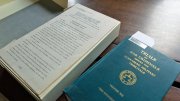William Kaelin, Farber professor of medicine, has won the Nobel Prize in physiology or medicine, the Nobel Foundation announced this morning. He shares the prize with Sir Peter J. Ratcliffe, of the University of Oxford, and Gregg Semenza ’78, of Johns Hopkins University, for their research on how cells adapt to changing oxygen levels.
The team “discovered how cells can sense and adapt to changing oxygen availability. They identified molecular machinery that regulates the activity of genes in response to varying levels of oxygen,” according to an announcement from the Nobel Assembly at Karolinska Institutet. “The seminal discoveries by this year’s Nobel Laureates revealed the mechanism for one of life’s most essential adaptive processes. They established the basis for our understanding of how oxygen levels affect cellular metabolism and physiological function. Their discoveries have also paved the way for promising new strategies to fight anemia, cancer and many other diseases.”
Kaelin is the forty-ninth Harvard faculty member to win a Nobel Prize. His most recent predecessor, economics professor Oliver Hart won the 2016 Nobel Prize in economic sciences for his advances in contract theory.
Kaelin’s fellow winner Gregg L. Semenza ’78 is Armstrong professor of medicine at the Johns Hopkins University School of Medicine. A Hopkins press release notes that his research paves the way for the development of drugs that could kill cancer cells by cutting off the supply of oxygen a tumor needs to grow, and could also lead to medicines allowing tissues affected by conditions such as arterial disease to survive on low oxygen.









